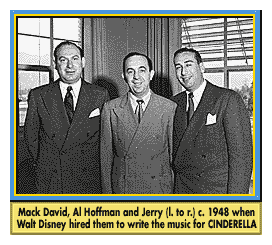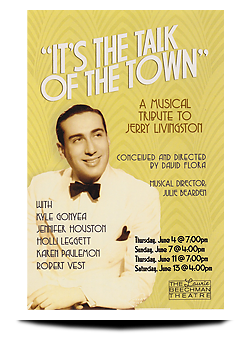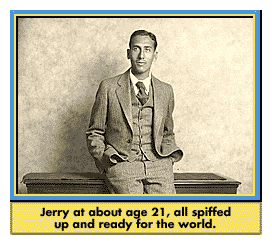|
|
|||||||
|
By
Dennis Livingston Jerry
101 I
usually begin by saying two things to people when
talking about my father, pop songwriter Jerry
Livingston. "That's Jerry, not Jay Livingston. Jay
is a great musical theater songwriter, but he's not
dad." And, "you probably never heard of Jerry, but
you certainly know his music." When you were a kid,
did your mom sing you "Mairzy Doats" or
"Fuzzy Wuzzy" to put you to bed? A few years
later, did you lap up the wonderful score to
Walt Disney's CINDERELLA? Did you ever snap
your fingers to the theme song from the television
show, "77 Sunset Strip"? Did you have the
band play "The Twelfth of Never" at your
wedding because it was "our favorite song"? Do you
find yourself looking for the standards of past
years that still have the power to move and thrill
us, songs like "It's The Talk of the Town"
or "Under A Blanket Of Blue" or "When
It's Darkness on the Delta"? Yes,
these songs, and hundreds more, were all composed
by Jerry Livingston. In a career spanning the 1930s
to the early 1970s, he contributed to a wide
variety of arenas, including the pop world of Tin
Pan Alley, movie and television theme songs, music
revues and the Broadway stage. For
example, in addition to the CINDERELLA songs -
which included Oscar nominee
"Bibbidi-Bobbidi-Boo" - he composed "The
Unbirthday Song" in Disney's ALICE IN
WONDERLAND, a host of songs featured in films made
by the comedy team of Dean Martin and Jerry Lewis
and the numbers warbled by Nat "King" Cole and
Stubby Kaye in the satirical western, CAT BALLOU.
Many leading television shows of the 1950s turned
to him for their theme music, including HAWAIIAN
EYE, BRONCO and SURFSIDE 6, while "This Is
It!" opened THE BUGS BUNNY SHOW with a
razzmitazz bang. If you know somebody who went to
UCLA, they couldn't escape hearing "Sons of
Westwood," Jerry's fight song for the school.
At the end of his career, Jerry poured his heart
into the score for the 1973 Broadway musical MOLLY,
based on characters created by show business legend
Gertrude Berg. Jerry's
collaborators comprise many of the renowned
lyricists of their time, including Marty Symes, Al
Neiburg, Mack David, Al Hoffman, Mann Curtis,
Milton Drake, Paul Francis Webster, Mitchell Parish
and Dok Stanford, among others. On several
occasions, entertainment celebrities sought him out
as a partner, such as Milton Berle in "I'd Give
A Million Tomorrows" and Count Basie in
"Blue And Sentimental." In 1980, Jerry was granted the culminating honor of his career by winning election by his peers to the Songwriters' Hall of Fame. In recognition of his heritage, Jerry was honored on the one hundredth anniversary of his birth with a tribute show in New York City called, naturally, IT'S THE TALK OF THE TOWN, produced and directed by David Flora at The Triad in March and The Laurie Beechman Theatre in June 2009. Out
of Denver An
interesting family saga lies behind the talent and
perseverance that Jerry brought to his work. He was
born as "Jerry Levinson" to parents of modest means
in Denver in 1909. His father, Sam Levinson, had at
one time harbored his own aspirations as an
entertainer. At about the age of 19, Sam traveled
to New York and became a singer (billed as "The
Silver-Voiced Tenor From The Golden West") at a
nickelodeon run by one William Fox. It was in this
place that he met my grandmother, Dora Lazarus, and
returned with her to Denver when she became
pregnant with Jerry. In later years, Sam
self-published several songs, but never got beyond
that. I often wonder how much of Jerry's drive came
from some inner desire to show he could make it in
a way that his father never did. Or maybe
not. Jerry
apparently had musical talent early on. Even as a
teenager, he was already playing piano in local
bands and hitting the road. In one such journey, in
1932, as the family story goes, the band he was in
found their gig in Ohio had been canceled because
the hotel had burned down. Jerry could have
returned to the hometown girlfriend in Denver. He
flipped a coin - back to Denver or continue to New
York to seek his fortune as a songwriter. New York
won. Unlike his father, he stayed put and within a
year or so had three hits ("Darkness On The
Delta," "Blanket Of Blue" and "Talk
Of The Town"). He never looked back. Big
Band days It
was in this period that he also was introduced - by
a songplugger getting off an elevator in the Brill
Building, no less - to a cute and perky singer,
Ruth Schwartz. Performing under the stage name
"Ruth Brent," and advertised as the "Princess of
Pert," she was all that, along with cute, vivacious
and sparkling. Before long, they were an item. When
I came along in 1940, Jerry gave up the touring
life and returned to his songwriting career. Ruth
had already abandoned her life as a singer when
they were married, but would remain his lifelong
companion and first listener for many of his
songs. In
the late 1940s, another turn of events would change
Jerry's life. Walt Disney came to town to audition
songwriting teams for a feature animation he was
planning about CINDERELLA. At the time, a novelty
song called "Chi-Babba Chi-Babba (My Bambino Go
To Sleep)" was on the air everywhere. It caught
Disney's fancy and he wanted to meet the authors -
Jerry, Mack David and Al Hoffman. They must have
put on a great audition, garnering the plum job of
writing the music for the movie. The
time Jerry spent in Los Angeles convinced him that
the music industry was moving west, and it was
enough already with New York winters. In 1952, we
all headed for LA, where Jerry extended his work to
the worlds of film and television. He was always a
modest, unassuming guy and was never interested in
travel or vacation - from what? one might ask - but
his one splurge was to buy the first and last house
he and Ruth ever owned, on North Rodeo Drive in
Beverly Hills. Surrounded by a nearby coterie of
other songwriter-friends, including Mack David and
Paul Webster, at the height of his career, Jerry
was content. It
would be pleasant to end the story there. But the
reality of changing musical tastes inevitably
caught up with Jerry and his crowd. The coming of
rock 'n roll, the advent of the singer-songwriter,
the use by movies of soundtracks instead of
original material, all conspired to devastate Jerry
and many in his generation of Tin Pan Alley
stalwarts. As he put it glumly, "the phone stopped
ringing." Death of a salesman time. But not quite.
In one last grand gesture, he joined a team that
brought a musical to Broadway in 1973 - MOLLY -
then endured an early closing. He never wrote
another song. Before
his death in 1987, Jerry requested no memorial or
special service be held. He cared nothing for such
things. And why not? His true legacy is a
collection of songs certain to bring laughter and
joy to generations of music lovers yet to
come. Other
Jerry Livingston pages: |







 By
the late 1930s, Jerry had achieved wide renown. He
decided to hop onto the big band craze by starting
his own ensemble. At this point, he was advised to
change his name because it would sound "funny" for
someone to hear "Jerry Levinson and his all star
band broadcast from high atop the whatever hotel."
Of course, "funny" meant "too Jewish." Much as I
might want to report that this bout of routine
anti-Semitism left him in anguish, to all
appearances he had no qualms, then or later, about
making the change.
By
the late 1930s, Jerry had achieved wide renown. He
decided to hop onto the big band craze by starting
his own ensemble. At this point, he was advised to
change his name because it would sound "funny" for
someone to hear "Jerry Levinson and his all star
band broadcast from high atop the whatever hotel."
Of course, "funny" meant "too Jewish." Much as I
might want to report that this bout of routine
anti-Semitism left him in anguish, to all
appearances he had no qualms, then or later, about
making the change.
